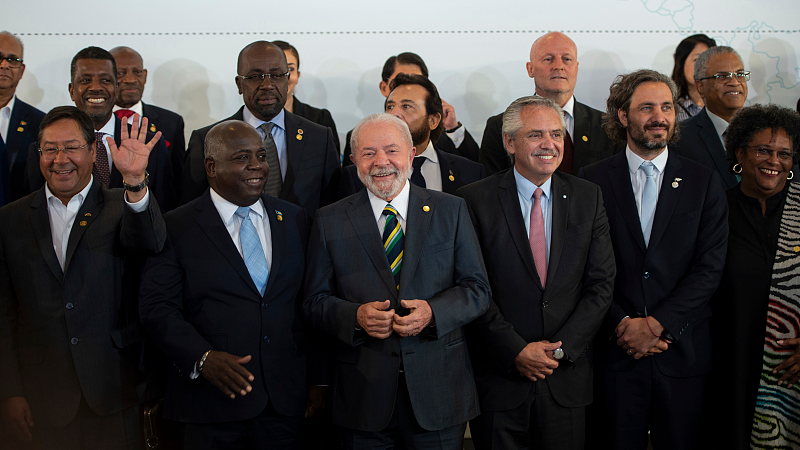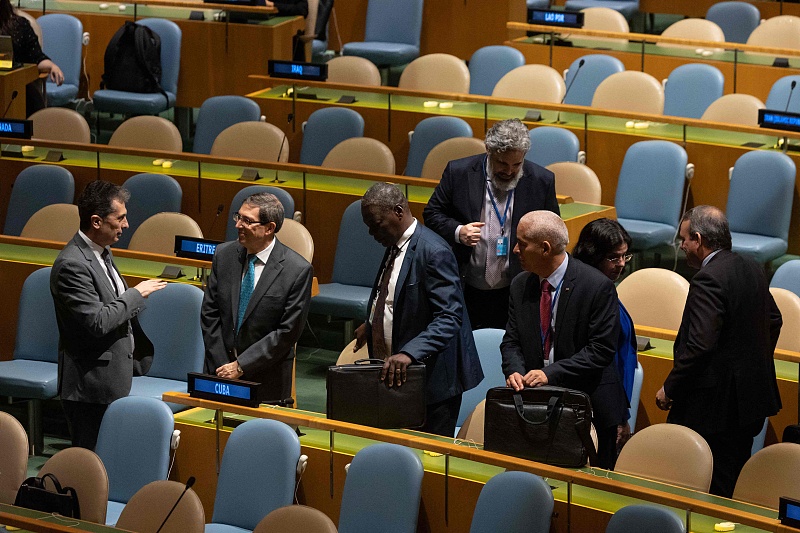
Leaders of the Community of Latin American and Caribbean States (CELAC) pose for a group photo at the CELAC Summit in Buenos Aires, Argentina, January 24, 2023. /CFP
Leaders of the Community of Latin American and Caribbean States (CELAC) pose for a group photo at the CELAC Summit in Buenos Aires, Argentina, January 24, 2023. /CFP
Editor's note: Pan Deng is a member of the Academic Committee at the Charhar Institute and the Executive Director of the Latin America and Caribbean Region Law Center of China University of Political Science and Law. The article reflects the author's opinions and not necessarily the views of CGTN.
Representatives of the CELAC (Community of Latin American and Caribbean States) member states gathered on January 24 in the Argentine capital Buenos Aires for its seventh summit.
The 'backyard' reunites as Brazil returns
After a six-year hiatus, the jigsaw puzzle is finally complete. In 2021, at the summit hosted by Mexico, the far-right Jair Bolsonaro was deliberately absent and refused to send his representative to the occasion. After Bolsonaro took office for a little over a year, he kept withdrawing Brazil from many frameworks, including from the CELAC. That was a devastating blow to the CELAC, for without Brazil's input, any regional arrangement would hardly be feasible.
Even before that, this supposedly annual summit did not continue after 2017, a year which saw disagreements around Venezuela tearing apart the fragile consensus among member states. There was also extreme pressure from former U.S. President Donald Trump to never allowed for a united, self-reliant "backyard" of the United States. El Salvador, as president pro tempore, was so powerless to organize summits that it declared a "period of reflection" for the CELAC and suspended all activities at all levels and agendas under the framework.
It was the left-wing Mexican President Andres Manuel Lopez Obrador who reactivated the CELAC and, after an unprecedented one-year role of president pro tempore, handed over the baton to Argentina. Earlier this year, Brazil rejoined the CELAC under President Luiz Inacio Lula da Silva during his first working week. The new president also made the summit the destination of his first international visit.
"Reunion" is the key message the organizers of this year's summit are sending to the international community.
Last year's Summit of the Americas (SOA), hosted by the United States, was boycotted by a number of Latin American leaders because the U.S. did not invite the leaders of Cuba, Nicaragua and Venezuela, making the summit the least attended since its inception. Argentine President Alberto Fernandez, who spoke at the opening ceremony as a representative of the CELAC, criticized the organizers of the SOA for interfering in the internal affairs of other countries and undermining the solidarity of Latin America under ideological excuses. He said that the CELAC summit hosted by him would invite all member states.
This year's CELAC summit was the result of the Argentine president making good on his promise.
CELAC enters another active cycle
It is more than a coincidence that left-wing leaders are the champions of the CELAC. The framework is the only multilateral intergovernmental organization in the Western Hemisphere that excludes the U.S. and Canada, while Cuba, Venezuela and Chile under President Michelle Bachelet, among others, were its initial advocates.
Since day one, the CELAC made no secret of the fact that it wanted to make its voice heard by building consensus and coordinating positions instead of sustaining the old order of the Western Hemisphere, where "the big powers called the shots."
The Latin American and Caribbean region was experiencing a "pink tide" at the time. Bypassing the Organization of American States, headquartered in Washington, D.C., other countries in the Western Hemisphere established an institutionalized platform for cooperation with the EU, East Asia and Russia in the collective form of the CELAC, and also formed a tradition of unifying positions in their dialogue with the U.S. before the SOA. It once flourished as a model of South-South cooperation and a counterweight to hegemony.
Since the Mexico City Summit of the CELAC in September 2021, the region has undergone a new "shift to the left," with progressive forces in charge of the seven most populous countries and six of the most important economies. With President Lula, the iconic leader of the "pink tide," joining Argentina in the design of the main topics of the summit, people have expressed high hopes for the Buenos Aires summit.

Members of the Cuban delegation arrive at a United Nations General Assembly meeting regarding the commercial and financial embargo imposed by the United States against Cuba, at the United Nations headquarters in New York City, U.S., November 2, 2022. /CFP
Members of the Cuban delegation arrive at a United Nations General Assembly meeting regarding the commercial and financial embargo imposed by the United States against Cuba, at the United Nations headquarters in New York City, U.S., November 2, 2022. /CFP
Opposing the U.S. embargo against Cuba in the economic and financial spheres was agreed upon as early as the CELAC foreign ministers' meeting last October, a meeting that was considered a technical preparatory meeting for the summit. Although the organizers had the facility to steer the agenda, claims that involve an individual country, such as supporting Argentina's legitimate sovereignty over the islands and maritime areas in question, were hardly the subject of this mechanism before. Compared with previous years, the leaders at this year's summit also changed the superficiality of their stance on regional issues and became particularly firm.
Integration resumes
In recent years, with accelerated changes in international geopolitics, especially the ongoing Russia-Ukraine tensions, the status of Latin America in the international landscape has been enhanced. The shift of the White House's strategic focus to the east and President Joe Biden's more moderate attitude toward Latin America have made it increasingly possible for Latin American countries to make autonomous decisions based on their own interests.
At present, as Latin American countries stand in a critical period of recovery and development in the post-pandemic era, breaking away from the dependence on major powers, achieving industrial integration and seeking independent development are the necessary ways to break the bottleneck of lagging growth in the region. The collective "shift to the left" of regional countries provides an opportunity to restart Latin American integration, and the CELAC has naturally been given the opportunity to function as a platform for that process.
Thus, inclusive development, science, technology and innovation, food security, and the fight against poverty and inequality were among the topics discussed at the summit. From "a single voice" to "integrated regional development," this summit is expected to be a milestone in the history of the CELAC.
The most exciting news for the region is that Argentina and Brazil announced shortly before the summit their decision to create a common currency, also open to other countries in the region.
Always an outpost and the hardest-hit region of the U.S. dollar relentlessly profiting from the world, Latin America has fallen into the "middle-income trap," and the Argentine peso and the Brazilian real have collapsed several times. The proposed common currency would replace the dollar as an economic and trade instrument within the currency zone and help deepen the trade system within the market.
The proposal was instantly well received at the summit and beyond, and several leaders have already voiced their support and interest in becoming a member of the currency zone.
However, the future of Latin America has not been in the hands of Latin Americans alone over the last two centuries since the Monroe Doctrine. As the backyard of the U.S., the region carries extensive interests of its northern neighbor. There has been more than one failed attempt of the region to rely on one single summit or organization to achieve autonomous development.
But at least this summit is a success in demonstrating long-lost hopes for the better.
(If you want to contribute and have specific expertise, please contact us at opinions@cgtn.com. Follow @thouse_opinions on Twitter to discover the latest commentaries in the CGTN Opinion Section.)